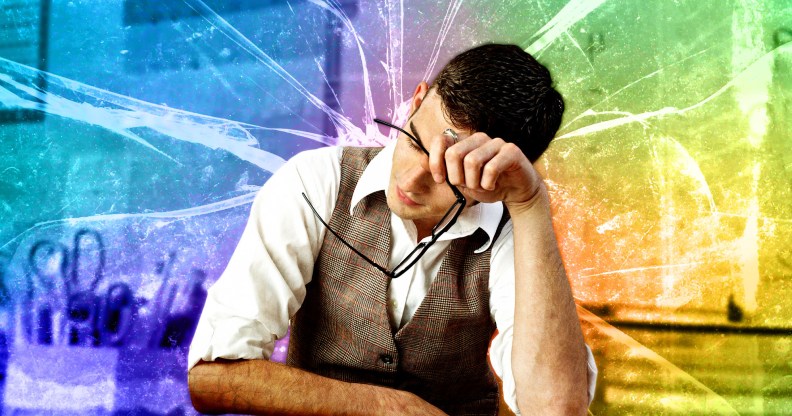As a gay teacher, students have never had a problem with my identity – until now

A gay teacher fears students are being influenced by anti-LGBTQ+ rhtetoric. (Getty)
After moving to a new secondary school, a gay teacher was met with hostility from students. In the first of a series of anonymous diary entries, he explains his fear that this is just the start of an increasingly personal battle.
I’ve been teaching for five years, and in that time I’ve been more or less open about my sexuality when asked by students.
During a placement early on in my career, a mentor spoke of coming out to a class after they playfully remarked on her love life. She brushed off their light-hearted observations by proclaiming that she had a wife.
When they came to me with similar jibes, as is the nature of working in a secondary school, I followed her example. The overarching temper of the room was one of harmlessness – their biggest disappointment that I’d not risen to their bait – and it built a bond with the class and my mentor as my training progressed.
This became the norm across the two subsequent schools I was employed by; students most enjoy learning when they feel a bond with the professionals delivering it, and I was happy to offer them scraps of information if it helped engage them in English lessons.
The two key principles I operated by were that I would only provide vague information when asked politely and respectfully, and only if it pertained to the curriculum matter in hand. After all, heterosexual teachers illustrate their lessons with anecdotes concerning wives, husbands and children, and I operated in the same way, experiencing nothing in the way of negativity until recently.
He flipped a chair and left the room without saying a word.
Last year, a male student interrupted me during our lesson to ask whether I was married, before a class of 30. He noted the ring on my left fourth finger.
“No, engaged,” I responded, keen to avoid further disruption.
“To a woman?” he asked.
I ignored him, but my red face and engagement admission was enough; a different student leapt from his seat, flipped a chair and left the room without saying a word.
During subsequent lessons, a pocket of polite, mostly female students were apologetic about their classmate’s deliberate attempt to cause discomfort, however the response from the majority of the class was apathetic, to say the least.
This hardly kept me awake at night but on reflection, it stung for two reasons: firstly, the conversation happened during my first lesson on my first day at a new school and more importantly, it was the first time I felt as if my identity as a gay man had been met with hostility from students.
Anti-LGBTQ+ media discourse is infiltrating schools
It’s been 20 years this November since the abolition of Section 28, which banned the so-called promotion of homosexuality and as a result, prevented teachers from addressing homophobic bullying. As a gay boy educated through its abolition, I remember boys being antagonised for being ‘feminine’, taunted with the names of gay or trans Big Brother contestants, and girls who played footballed goaded with derogatory taunts about their genitals.
In the decades since, things have changed for the better – we’ve seen an upwards trend of acceptance tangible across the love-is-love, blockbuster Pride events that are now a staple across the UK.
While LGBTQ+ students are still twice as likely to be bullied as their peers, research suggests, inclusion felt ingrained into the culture of education as I entered the profession in 2018.
The incident in my new school, however, made me aware that students are not immune to the impact of the increasingly loud anti-LGBTQ+ discourse in the media.
Since September, I have taught students who have displayed homophobic attitudes. A boy was placed into my group after being removed from another due to his inability to tolerate an out-and-proud gay classmate.
At first, the move seemed positive and I was hopeful that his attitude could be changed. But as lessons continued, his presence seemed to liberate fellow classmates. One proudly exclaimed that he had been sanctioned after goading a member of staff, asking if they were on Grindr. Other students seemed to take pleasure in deliberately misgendering and deadnaming trans classmates.
I challenged these incidents as they happened, but I felt as if I was fighting a losing battle.
Pockets of society have found a voice vilifying transgender identities in recent years; a tirade which has bubbled insistently for a long time, but thanks to some highly-placed critics, this abuse has been amplified and spilled over into education.
This is largely, I think, thanks to digestible 15-second clips on TikTok making their way directly to the eyeballs of impressionable teenagers.
For me, detailing the microcosm of my own personal classroom experiences, it feels like the beginning of an increasingly personal battle, in which many queer staff and most importantly, students, may become wounded.
I fear for the lesbian, gay, bisexual, trans and queer students witnessing more overt examples of hatred in classrooms, and for the staff on the receiving end of more volatile abuse than I have experienced.
How did this story make you feel?

